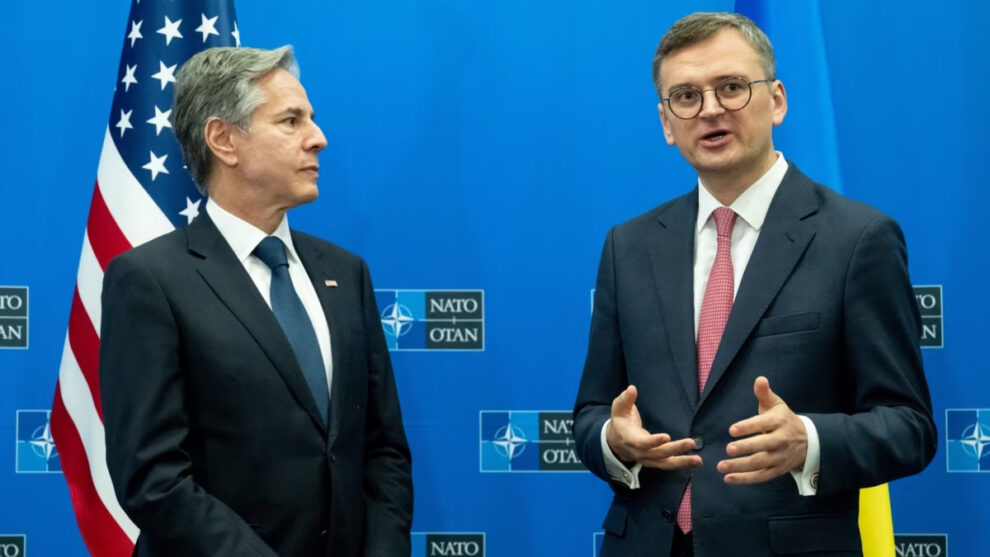For the first time, Minister of Foreign Affairs of Ukraine Dmitry Kuleba took part in the NATO-Ukraine Council at the level of heads of foreign affairs agencies
KYIV – The NATO-Ukraine Council intends to transform the Comprehensive Assistance Package into a multi-year program to help rebuild Ukraine’s security and defense sector and support Ukraine’s long-term deterrence and defense. This is stated in the Memorandum on November 29 following the meeting of the NATO-Ukraine Council in Brussels.
“As part of these efforts, we are developing a roadmap for Ukraine’s transition to full interoperability with NATO. We are also developing new projects for humanitarian demining, medical rehabilitation of wounded Ukrainian military personnel and the development of Ukraine’s defense-industrial potential based on a strategic review of defense procurement,” the Alliance website emphasizes.
The document also notes that Ukraine has confirmed its commitment to continuing democratic and security sector reforms.
“NATO member states have provided Ukraine with recommendations for priority reforms. The NATO-Ukraine Council welcomes Ukraine’s submission of the adapted Annual National Program for 2024 and looks forward to its implementation,” the Memorandum emphasizes.
Secretary General Jens Stoltenberg, speaking after the Council meeting, noted that the transformation of the NATO Comprehensive Assistance Package into a multi-year assistance program is intended to help Ukraine “transition from Soviet-era equipment to NATO equipment and standards and ensure full interoperability of Ukrainian armed forces with ours.”
Jens Stoltenberg, summing up the meeting of foreign ministers, noted that “Ukraine is closer to NATO than ever before.”
The foreign ministers also discussed Ukraine’s path to Alliance membership and made recommendations on Ukraine’s priority reforms, including combating corruption, strengthening the rule of law and supporting human and minority rights, the Alliance website reports.
The NATO-Ukraine Council held a meeting at the level of foreign ministers for the first time, in which Ukrainian Foreign Minister Dmytro Kuleba took part.
A categorical “no” to hints about Western fatigue
In a comment to reporters, Ukrainian Foreign Minister Dmitry Kuleba emphasized that at the Council meeting there was a “categorical no” to all hints about Western fatigue from the war in Ukraine.
“And no less categorically – “yes” to continued support for Ukraine. Today was better than I expected in this regard. Colleagues did not just state certain things, but actually confirmed that assistance would continue and increase. The main thing is that all ministers felt the need to clearly state that there is no talk and cannot be of any war fatigue in their countries and governments,” said Dmitry Kuleba.
During a conversation with the press, Dmitry Kuleba, also in response to a question about territorial concessions in exchange for the opportunity to become a member of the Alliance, suggested that those who advise this should do the same: give up their territory, give up their people.
“And if they do this, then I am ready to listen to their arguments,” said the Ukrainian Foreign Minister.
Secretary of State Antony Blinken said Wednesday there is “no sense of fatigue” among NATO allies when it comes to helping Ukraine.
“We must continue to support Ukraine and will (do so),” the head of the State Department said at the end of the NATO-Ukraine meeting in Brussels, adding that NATO allies are unanimous in this conviction and that members of both houses of Congress have also consistently advocated support for Ukraine.
Accession “in parts” is impossible
The thesis that “NATO can accept Ukraine only after the end of the war,” according to political scientist Oleg Lisnoy, should be understood based on the Ukrainian vision of the end of the war.
“For us, the end of the war is clear – in what sense this should happen. But we must understand that all the same, the admission of Ukraine to the Alliance is political will and decision,” Oleg Lisny tells a correspondent of the Russian service of the Voice of America.
He notes that for Ukraine to join NATO, it is necessary to end the war and carry out reforms in the country. Oleg Lisny also believes that the rhetoric about Ukraine joining NATO “in parts” does not stand up to criticism.
“Under no circumstances can we agree to such a precedent. When they talk about it, they give examples of Germany, that first one part of it joined the Alliance, and then the other. Another important question is what to do with the millions of people in the occupied territories? There are no answers to it. Some people recommend the Finnish version. Finland and the USSR paid for peace with territories, but they took all their people out of the occupied lands,” emphasizes Oleg Lisny.
He believes that neither the authorities nor the people will agree to the option of Euro-Atlantic integration of Ukraine without the occupied territories.
“The world can end very badly at any cost. Our opponent is Russia, which does not fulfill its obligations. It is necessary to adhere to the borders established by international law, exert international pressure on Russia and carry out de-occupation of territories,” says the political scientist.
Security and the Shield of Europe
International political scientist Anton Kuchukhidze notes that discussions about the Euro-Atlantic integration of Ukraine do not cancel the main basic principle – ensuring the territorial integrity of the country.
“The basic position is that Ukraine will not give up its territories. This is a principled position, it was voiced by the President of Ukraine, and the Minister of Foreign Affairs confirmed it. Territorial integrity and sovereignty are paramount. These are the duties of the authorities according to the Constitution of the country – to ensure security, sovereignty and territorial integrity. There can be many discussions, and today Mr. Kuleba noted that sometimes he hears such an idea in the West – concessions in exchange for joining NATO, but Ukraine refuses this idea,” Anton Kuchukhidze tells the correspondent of the Russian service of the Voice of America.
He believes that any formula, “freezing” the conflict, which does not provide for Russia’s defeat on the battlefield, will lead to a return to hostilities.
“If anyone thinks that Russia will stop, even if Ukraine theoretically renounces NATO membership, then they are deeply mistaken. Russia went to war to prevent Ukraine from joining NATO. And if anyone in the West has forgotten, this is Russia’s war against Ukraine. In the Russian mentality, this is a war against NATO. The issue needs to be resolved strategically; the aggressive policy of the Kremlin must be changed as a threat to the security system in the Euro-Atlantic region,” emphasizes Anton Kuchukhidze.
According to him, to maintain security conditions in Europe and the world, it is necessary to defeat Russia on the battlefield.
“Negotiations with Russia are not working. Therefore, NATO should unite with Ukraine as much as possible and support, and hear Stoltenberg that Russia has weakened in the political and military sense, but we should not underestimate it and we need to prepare for protracted scenarios for the development of the situation,” notes Anton Kuchukhidze.
Source : Голос Америки









